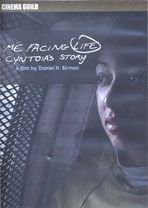
Me Facing Life: Cyntoia’s Story 2010
Distributed by Cinema Guild, 115 West 30th Street, Suite 800, New York, NY 10001; 212-685-6242
Produced by Daniel H. Birman
Directed by Daniel H. Birman
DVD, color, 51 min.
Sr. High - General Adult
Adolescence, Adoption, Child Development, Criminal Justice, Education, Ethics, Journalism, Psychology
Date Entered: 10/12/2011
Reviewed by Winifred Fordham Metz, University of North Carolina at Chapel HillOver the course of six years, Director Daniel Birman filmed—with open access (granted by the juvenile justice system)—an incarcerated Cyntoia Brown, her adoptive mother, her birth mother, a forensic psychiatrist, and others tied to her case. The result is a 51-minute documentary that raises more questions than provides answers.
Birman opens his documentary with a host of numbers and statistics: an average of 2.3 million juveniles are arrested each year in the U.S.; one-third of these are girls; most report a history of abuse. We quickly learn that Cyntoia is a member of this population.
Articulate, passionate and fairly self-aware, Cyntoia is a mere 16 when the audience is first introduced to her. Birman picks up her story just days after her incarceration for murder. Through interviews observed between Cyntoia and Dr. William Bernet, a forensic psychiatrist at Vanderbilt University, we hear the events leading up to the crime and pieces of her history that propelled her there.
Cyntoia was left with her [eventual] adoptive mother, Ellenette Brown, when she was only a few months old. Abandoned by her biological mother for more than a year, Cyntoia is later kidnapped at 18 months. Reunited with her adoptive family several months later, Cyntoia struggled to feel safe and attach to anyone but her adoptive mom. Her childhood and early adolescence were peppered with violence and upheaval, resulting in Cyntoia running away from home, her drug use and subsequent prostitution.
The multiple interviews with Cyntoia’s biological mother unearth generations of mental illness, suicidal tendencies and drug addiction. Bernet asserts that this unavoidable genetic fabric combined with her life history helped dictate the concluding criminal act. The pattern of bad things that happened to her shape the way she relates to people. Cyntoia’s defense hoped that this testimony would temper judgment in her fitness hearing. Ultimately, it is decided that Cyntoia will stand trial for premeditated murder as an adult.
This is an important film because in the telling of Cyntoia’s story, it very effectively illustrates the myriad of problems in trying at-risk youth in an adult system. The film is not without fault, however. Where it does due diligence in tracing Cyntoia’s roots back to her biological mother’s and grandmother’s mental illnesses, it does little to cover her childhood and adolescence with any comprehension. And, its interviews with Cyntoia are ultimately slight and yield too little in relation to the mounting questions and issues raised.
Awards
-
Winner, Silver Telly, 32nd Annual Telly Awards